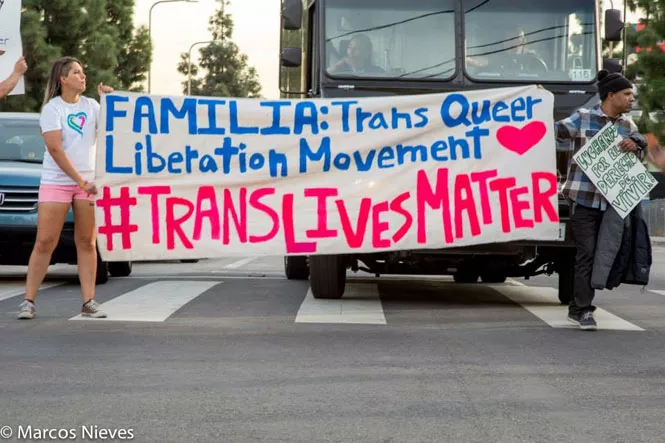
- Activists with the Familia Trans Queer Liberation Movement rally in California. Leaders of the Utah branch hope to build a similar level of engagement locally.
In California, the Familia Trans Queer Liberation Movement has held marches and protests, thrown fundraisers and even had activists shut down roadways in calling for greater recognition of undocumented LGBT Latinos. In Salt Lake City, the Utah chapter hosted its first meeting in December with a handful of members filling a pair of tables with coffee cups and laptops at Mestizo Coffee House at 641 W. North Temple.
Despite the small turnout, attendees were buoyed by a sense of purpose and a fitting coffeehouse soundtrack that shifted from civil-rights-era classics like Sam Cooke's "A Change Is Gonna Come" to the Bill Withers tune "Lean on Me."
The group knows that growing something from the gritty grassroots can be a slow process, especially when reaching out to the doubly marginalized population of undocumented Latinos who are also striving for acceptance of their sexual identity and orientation.
"This is very much an invisible problem," says Ella Mendoza, a 24-year-old undocumented immigrant who has been in Utah since she was 12 and has been out as gay since she was 15. LGBT Latinos, she says, have to contend not only with racial stigma but also the conservative Latino culture—all wrapped up in Utah's overarching conservative LDS culture.
Familia co-organizer Eusebio Echeveste was in high school when word of his first boyfriend got out and reached his parents. The reaction was typical: His mother cried and cried and his father refused to accept it—or him. The two still do not communicate.
"Ever since then, it's been ... isolation, keeping myself away from everybody because I don't want that trouble," says Echeveste, now 19.
Mendoza came out as a teenager, and while the reaction wasn't hostile, she says she still feels like she's continually coming out to friends and family struggling to understand her "queerness."
"The idea that not every little girl wants a Quinceañera is just insane" in the Latino community, she says.
"We need to feel like we are welcome here," Mendoza says. "I want to be able to talk about my queerness and speak in my own language. I want to talk about my queerness and not encounter machismo; I want to talk about my queerness and feel like I belong."
Mendoza and Echeveste have taken advantage of President Obama's 2012 Deferred Action for Childhood Arrivals policy, which allows children brought into the country to live under the color of the law and be able to work legally. With that status, they're publicly reaching out to other undocumented Latinos who are gay or transgender to let them know they have a community that will understand what they're going through.
The group formed after attending a Familia encuentro—a conference—in New Mexico. The national group will host another such conference in the northeast sometime in 2015, and hopes by 2016 to have chapters spread all across the country.
Eventually, Echeveste says, the Utah group will begin fundraising and helping to shed light on critical issues like the dangers faced by transgender Latinos who end up in immigration detention facilities. He points out that an immigrant transitioning from a male to female gender identity will still be detained with men, even if they don't identify as male.
"That means more rape is going to happen, more judgment, more verbal and physical abuse—it happens, and it's still happening," Echeveste says.
But he also wants the group to help out all of the undocumented—it's estimated there are 100,000 undocumented immigrants in Utah.
"I want this organization to be not only just for Latino undocumented queers, but for everyone," Echeveste says. "I want it to be a safe place."
Building a safe place means a lot of work, and it also means redefining what "normal" is, Mendoza says. No longer should "normal" mean discrimination and violence against the marginalized, she says. And that will also mean bringing this population out from the margins.
Mendoza is untroubled by the group's humble start. She recalls that once, no one showed up to a workshop she held for undocumented Latinos. But she listed her phone number with the event and was soon flooded with calls from undocumented immigrants who wanted to attend but were afraid to.
"People are afraid to come out of the shadows," Mendoza says. "But that doesn't mean they're not there."
For more information, visit FamiliaTQLM.org or Utah's Familia: Trans Queer Liberation Movement on Facebook.